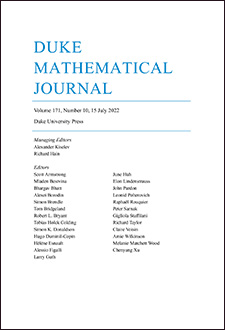Yves Colin de Verdière, Luc Hillairet, Emmanuel Trélat
Duke Math. J. 167 (1), 109-174, (15 January 2018) DOI: 10.1215/00127094-2017-0037
KEYWORDS: sub-Riemannian Laplacian, contact manifolds, quantum ergodicity, 35P20, 53D10, 53D25
This is the first paper of a series in which we plan to study spectral asymptotics for sub-Riemannian (sR) Laplacians and to extend results that are classical in the Riemannian case concerning Weyl measures, quantum limits, quantum ergodicity, quasimodes, and trace formulae. Even if hypoelliptic operators have been well studied from the point of view of PDEs, global geometrical and dynamical aspects have not been the subject of much attention. As we will see, already in the simplest case, the statements of the results in the sR setting are quite different from those in the Riemannian one.
Let us consider an sR metric on a closed -dimensional manifold with an oriented contact distribution. There exists a privileged choice of the contact form, with an associated Reeb vector field and a canonical volume form that coincides with the Popp measure. We establish a quantum ergodicity (QE) theorem for the eigenfunctions of any associated sR Laplacian under the assumption that the Reeb flow is ergodic. The limit measure is given by the normalized Popp measure.
This is the first time that such a result is established for a hypoelliptic operator, whereas the usual Shnirelman theorem yields QE for the Laplace–Beltrami operator on a closed Riemannian manifold with ergodic geodesic flow.
To prove our theorem, we first establish a microlocal Weyl law, which allows us to identify the limit measure and to prove the microlocal concentration of the eigenfunctions on the characteristic manifold of the sR Laplacian. Then, we derive a Birkhoff normal form along this characteristic manifold, thus showing that, in some sense, all -dimensional contact structures are microlocally equivalent. The quantum version of this normal form provides a useful microlocal factorization of the sR Laplacian. Using the normal form, the factorization, and the ergodicity assumption, we finally establish a variance estimate, from which QE follows.
We also obtain a second result, which is valid without any ergodicity assumption: every quantum limit (QL) can be decomposed in a sum of two mutually singular measures: the first measure is supported on the unit cotangent bundle and is invariant under the sR geodesic flow, and the second measure is supported on the characteristic manifold of the sR Laplacian and is invariant under the lift of the Reeb flow. Moreover, we prove that the first measure is zero for most QLs.

